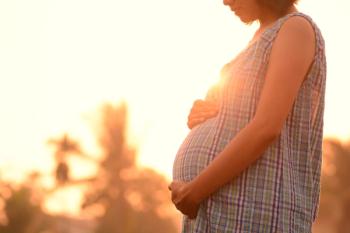
Prolonged stress and anxiety during pregnancy disruptive to fetal brain development
Research from the Developing Brain Institute found maternal psychological distress during the COVID-19 pandemic had disrupted critical processes of fetal brain development.
Prolonged levels of maternal stress and postnatal depression in pregnant women during the COVID-19 pandemic may hinder structural development in key regions of the fetal brain, according to research in Communications Medicine.1
Researchers at the Developing Brain Institute in Washington, DC saw a unique opportunity during the pandemic—to investigate the short- and long-term impacts of prenatal stress on early brain development. The findings may lead to a deeper understanding of early childhood development and provide insight into factors relating to cognitive- and health-related issues later in life.
“Understanding how contemporary stressors may influence fetal brain development during pregnancy has major implications for basic science and informing public policy initiatives,” said Catherine Limperopoulos, PhD, chief and director of the Developing Brain Institute at Children’s National and the study’s senior author.2
Limperopoulos and her research team used magnetic resonance imaging (MRI) scans, advanced image processing techniques, artificial intelligence, and 3-dimensional brain mapping to observe fetal brain tissue volumes and development activity in 2 groups of pregnant women.
The initial research began in March 2014 and continued until February 2020, when 137 healthy pregnant women were enrolled in a longitudinal study of normative fetal brain development in low-risk patients, all with normal prenatal history. During the visit, mothers underwent MRI scans and reported their levels of distress using 4 validated stress, anxiety, and depression scales.
To evaluate pregnancies during the pandemic, the research team then enrolled a second group of 65 women—all with no known exposure to COVID-19—to compare to the previous group. The second group of women also underwent MRI scans and recorded their stress levels each time. All 202 women were between 16.7 to 39.1 gestational weeks when 274 fetal brain scans were taken.
Stress and depression scores in the pandemic group were significantly higher than those in the pre-pandemic group and correlated directly to impaired fetal brain growth, with evidence of decreased amounts of fetal white matter, hippocampal, and cerebellar volumes, and delayed development of fetal brain folds. They also showed lower brain surface area, gyrification, and sulcal depth than the pre-pandemic fetal brain data.
Among 173 pregnant women with available maternal distress measures, 27.6% (n=34) of the prepandemic[LL1] group and 52 (n=26) in the pandemic group showed elevated levels of psychological distress. Higher levels of anxiety and stress, researchers found, were linked to smaller hippocampus and cerebellar volumes.
The median gestational age at the time of MRI was 30.2 weeks (range from 16.7 to 39.1) in the prepandemic[LL2] group and 30.8 weeks (range from 17 to 38.4) in the pandemic group. The median maternal age was 34.1 years old (range from 17 to 51 years). At birth, the median gestational age was 39.6 weeks (range: 31.0 to 41.9), and the median birth weight was 3.36 kg (range: 1.02 to 4.70).
These findings present an opportunity for ob-gyns and prenatal care providers to counsel patients on the importance of mental health during and after pregnancy. More research is needed, according to the research team, to understand the potential long-term neurodevelopmental consequences of altered fetal brain development in pandemic-era pregnancies.
Originally published on our sister brand,
References:
- Proofpoint Isolation. Urlisolation.com. Published 2022. Accessed May 26, 2022.
https://urlisolation.com/browser?clickId=5F38A541-6A1E-46E0-B4D7-74C9C426FEED&traceToken=1653583718%3Bcnmc_hosted%3Bhttps%3A%2Fwww.nature.com%2Farticles%2Fs&url=https%3A%2F%2Fwww.nature.com%2Farticles%2Fs43856-022-00111-w - GLOBE. Pandemic-related stressors in pregnant women may impact their babies before they’re born. Bluefield Daily Telegraph. Published May 26, 2022. Accessed May 26, 2022.
https://www.bdtonline.com/news/nation_world/pandemic-related-stressors-in-pregnant-women-may-impact-their-babies-before-they-re-born/article_68121a19-9420-5250-a2ad-8947d3261b1a.html
Newsletter
Access practical, evidence-based guidance to support better care for our youngest patients. Join our email list for the latest clinical updates.






